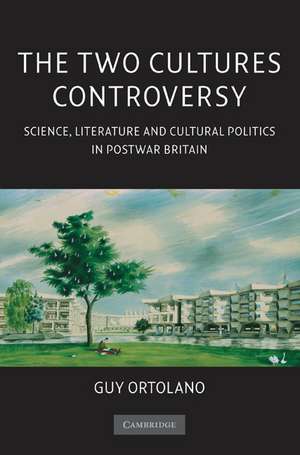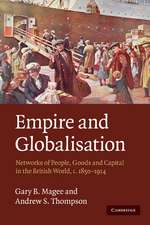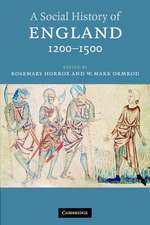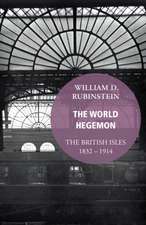The Two Cultures Controversy: Science, Literature and Cultural Politics in Postwar Britain
Autor Guy Ortolanoen Limba Engleză Paperback – 4 mai 2011
| Toate formatele și edițiile | Preț | Express |
|---|---|---|
| Paperback (1) | 363.13 lei 6-8 săpt. | |
| Cambridge University Press – 4 mai 2011 | 363.13 lei 6-8 săpt. | |
| Hardback (1) | 685.74 lei 6-8 săpt. | |
| Cambridge University Press – 7 ian 2009 | 685.74 lei 6-8 săpt. |
Preț: 363.13 lei
Nou
Puncte Express: 545
Preț estimativ în valută:
69.49€ • 74.30$ • 57.94£
69.49€ • 74.30$ • 57.94£
Carte tipărită la comandă
Livrare economică 17 aprilie-01 mai
Preluare comenzi: 021 569.72.76
Specificații
ISBN-13: 9781107402706
ISBN-10: 1107402700
Pagini: 308
Dimensiuni: 152 x 229 x 18 mm
Greutate: 0.45 kg
Editura: Cambridge University Press
Colecția Cambridge University Press
Locul publicării:New York, United States
ISBN-10: 1107402700
Pagini: 308
Dimensiuni: 152 x 229 x 18 mm
Greutate: 0.45 kg
Editura: Cambridge University Press
Colecția Cambridge University Press
Locul publicării:New York, United States
Cuprins
Introduction; 1. C. P. Snow and the technocratic liberalism; 2. F. R. Leavis and the radical liberalism; 3. A tale of two colleges; 4. The making of English social history; 5. The rise of national 'decline'; 6. Post-colonial developments; 7. The eclipse of the meritocratic moment; Conclusion.
Recenzii
Review of the hardback: 'The Two Cultures Controversy provides a full and persuasive account of Snow's public roles during his years of fame and a thoughtful exploration of the ramifications of the debate surrounding his celebrated lecture. On these grounds, it will be of considerable value to cultural, educational and political historians of the period, as well as of interest to a wider readership curious about the origins and continuing significance of a famous phrase.' Stefan Collini, Twentieth Century British History
Review of the hardback: 'This is an exceptionally thoughtful and thought-provoking work from which (truly) every modern British historian will learn something fresh and useful.' Peter Mandler, H-Net
Review of the hardback: 'An excellent piece of work … Ortolano gives us [a] widescreen, wrap-around cultural history of postwar Britain.' John Toye, Economic History Review
Review of the hardback: 'Guy Ortolano has provided us with a detailed and insightful study … [He] shows … how we can use the Two Cultures to understand the wider ideological and social currents to which it was intimately related: liberalism, declinism, meritocracy, and technocracy.' Waqar Zaidi, Journal of British Studies
Review of the hardback: 'As I read further and further into this text, I could ever more readily hear and feel, even smell, a Britain now largely gone. … Ortolano has captured an important lost moment - even a last moment - in the rise and fall of a Britain dominated by a narrow educational and social ruling stratum.' David Coates, American Historical Review
Review of the hardback: '… a very important work on a key topic of twentieth-century British history. … [Ortolano] has given an excellent foundation on which further studies can be based.' British Journal for the History of Science
Review of the hardback: 'Ortolano has brought [Snow and Leavis] splendidly back to life … At the same time, thoroughly and imaginatively discussed here, the debate and its ramifications raise issues important for Britain and elsewhere for the second half of the 20th century and beyond. Highly recommended.' Peter Stansky, Choice
Review of the hardback: 'Ortolano provides a detailed and illuminating history of the controversy … This is a highly readable and informative study.' Mary Jo Nye, Isis
Review of the hardback: 'In this deeply researched and closely argued book, Guy Ortolano … helps explain why what began as a rather modest Cambridge lecture became the focus of some of the sharpest and most significant debates of the postwar era.' Bruce J. Hunt, British Scholar
Review of the hardback: 'This is an exceptionally thoughtful and thought-provoking work from which (truly) every modern British historian will learn something fresh and useful.' Peter Mandler, H-Net
Review of the hardback: 'An excellent piece of work … Ortolano gives us [a] widescreen, wrap-around cultural history of postwar Britain.' John Toye, Economic History Review
Review of the hardback: 'Guy Ortolano has provided us with a detailed and insightful study … [He] shows … how we can use the Two Cultures to understand the wider ideological and social currents to which it was intimately related: liberalism, declinism, meritocracy, and technocracy.' Waqar Zaidi, Journal of British Studies
Review of the hardback: 'As I read further and further into this text, I could ever more readily hear and feel, even smell, a Britain now largely gone. … Ortolano has captured an important lost moment - even a last moment - in the rise and fall of a Britain dominated by a narrow educational and social ruling stratum.' David Coates, American Historical Review
Review of the hardback: '… a very important work on a key topic of twentieth-century British history. … [Ortolano] has given an excellent foundation on which further studies can be based.' British Journal for the History of Science
Review of the hardback: 'Ortolano has brought [Snow and Leavis] splendidly back to life … At the same time, thoroughly and imaginatively discussed here, the debate and its ramifications raise issues important for Britain and elsewhere for the second half of the 20th century and beyond. Highly recommended.' Peter Stansky, Choice
Review of the hardback: 'Ortolano provides a detailed and illuminating history of the controversy … This is a highly readable and informative study.' Mary Jo Nye, Isis
Review of the hardback: 'In this deeply researched and closely argued book, Guy Ortolano … helps explain why what began as a rather modest Cambridge lecture became the focus of some of the sharpest and most significant debates of the postwar era.' Bruce J. Hunt, British Scholar
Notă biografică
Descriere
This book recasts the notorious 'two cultures' controversy as an ideological conflict between competing visions of British society and culture.













